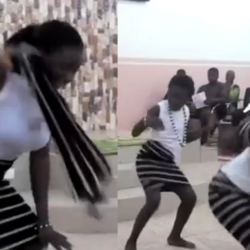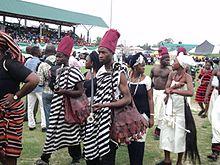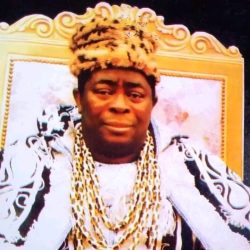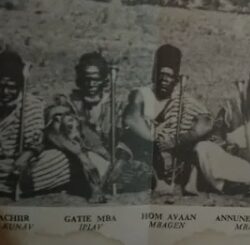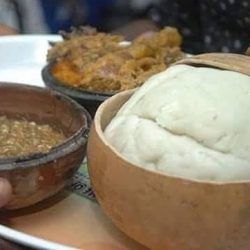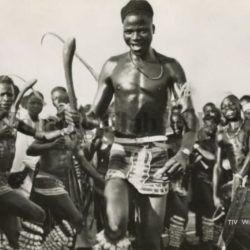Tsav-utu Dance
There is a belief among the Tiv of the existence of a spirit world inhabited by the dead that carry out normal activities just as in the real world. The term Tsav-utu connotes night witchcraft practices.

The dance is made up of dance steps from various dances and body movements. Props used in the dance such as spears, arrows, guns and also lighted pots, carried by special girls believed to have died as virgins. The girls are symbols of purification of Tsav-utu dance as much importance is attached to the lighted pot.
The figures on stools represents the manner in which they carry out attach on their victims hence they do not want to leave any foot prints.
The lead drummer exercises a firm control of the dance in their spirit world as he keeps watch over the witches’ victims for fear of the victims escaping to the real world.
Ishen
Ishen is a traditional dance, the dance steps derived from the act of cloth weaving. Ishen dance steps performed by Benue State Arts Council Performing Troupe are that of Mr. Dwem Yawe, dance group from Tsambe, Vandeikya Local Government Area of Benue State.
Apart from the colourful costumes of the dancers, the stylistic dance steps are majestic, intricate and energetic. Ishen is the current champion of dances in Benue State.
Swange
Swange is a very popular Tiv music/dance which is played all over Tiv land and where Tiv people reside in large numbers. It is a social dance that exhibits bodily movement from akin to oriental dances. Presently, the Performing Troup of Benue State Arts Council made up of ladies and gentlemen have since promoted Swange Dance to a professional status.
Division Dance
Is a Tiv traditional dance which was originated by the craving for the creation of the Katsina-Ala Local Government Area of Benue State. The creation of the Local Government satisfied the yearnings and aspirations of the people of the locality of bringing government nearer to the people, hence the evolution of the dance Division. The dance is characterized by strong rhythmic drumming, colurful costumes and dance steps that stimulate the emotions and amuse the audience.
Ange Dance
Ange is one of the oldest traditional dances from Ajio in Kwande Local Government Area of Benue State. Led by Ende Kpera, it was originally performed only at funeral ceremonies but is at present performed at all functions. It exhibits intricate dance steps and is performed by both sexes.
Meemeh (Dance Drama)
This dance drama was written, directed by Mr. Richard Tsevende and was first staged at the launching of the Troupe in 1982. It was featured at the Music Festival organized by the Commonwealth Institute, London in 1983.
Meemeh is a tragic comedy based on a popular Tiv folktale. In the play, King Hungwabursa is depressed over having no children and turns to his court for advice. Queen Anagajiya is blamed by the court and cast out of the palace. As luck would have it, she was in fact pregnant at the time.
In a despicable hut far away from the glamour of the palace, she gives birth to a son called “Meemeh”. The boy brings joy to the uncared for Queen but this soon turns to sorrow. The King having learnt of the birth of the child, comes and take him away from his mother.
In the palace, Meemeh assumes his position as Prince and soon forgets his mother. The old Queen one day approaches him for meat. She request for just the entrails from his next kill as meat for her.
Meemeh agrees but the wicked boy wraps dung and gives it to his mother. Infuriated by the deceit, the mother curses him and Meemeh is attacked by a buffalo the following day.
The wounded Meemeh is found by a fellow hunter and carried to the palace. The King, the step-mother, and a powerful medicine man called the Great Afena all try in vain to revive the Prince.
A bird sings a phrase which Afena interprets. The phrase is that of some unknown forces (spirits). The old Queen Anagajiya is sent for. At first she refused to come but the King’s persistence persuades her and she agrees to come. The old Queen’s sudden agreement to come and revive Meemeh indicated the presence of some unknown forces. She gives medicine to her son, Meemeh, who regains consciousness and the court rejoices. Meemeh then begs his mother for forgiveness and asks the King to reinstate her as Queen. The King does so and all the people rejoice.
As a dance drama based on Tiv folktale, Meemeh is also laced with elements of the popular Tiv Kwagh-Hir Puppet Theatre.
Kwagh-Hir, is a Tiv phrase for story telling or folktale. This is a traditional theatre form performed at night. Various aspects of the Kwagh-Hir have been used interchangeable in the story-line of the dance drama.

